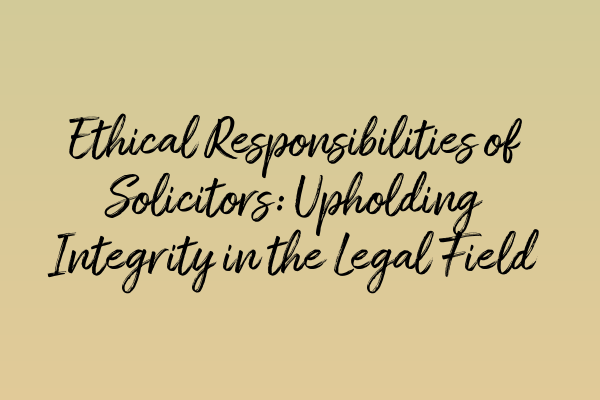Ethical Responsibilities of Solicitors: Upholding Integrity in the Legal Field
Introduction
In the legal profession, integrity and ethical behavior are paramount. Solicitors play a crucial role in upholding justice and fairness within society. As trusted legal advisors, they have a responsibility to maintain the highest standards of professional conduct. In this blog post, we will explore the ethical responsibilities of solicitors and the importance of upholding integrity in the legal field.
Importance of Ethics in the Legal Profession
Ethics, in the context of the legal profession, refers to the moral principles that guide solicitors in their professional conduct. Upholding ethical standards ensures that solicitors act in the best interest of their clients, maintain the public’s trust, and contribute to a just legal system. Ethical behavior is not only a legal requirement but also the foundation of a successful and respected legal career.
Client Confidentiality and Trust
One of the fundamental ethical principles for solicitors is maintaining client confidentiality. Solicitors have a duty to protect the privacy and trust of their clients. This duty extends beyond the duration of the solicitor-client relationship and applies even after it ends. Confidentiality helps create an environment where clients can freely share sensitive information, enabling solicitors to provide effective legal advice and representation.
Conflict of Interest
Solicitors must avoid conflicts of interest, both actual and perceived, to ensure that their clients’ interests remain their primary focus. A conflict of interest arises when a solicitor’s personal, financial, or other professional interests may interfere with their ability to provide unbiased advice and representation. By maintaining independence and avoiding conflicts, solicitors can preserve their clients’ trust and ensure the integrity of the legal system.
Professional Competence and Diligence
Solicitors have a duty to provide competent and diligent legal representation to their clients. This means staying up-to-date with changes in the law, legal precedents, and best practices. By continually expanding their knowledge and skills, solicitors can provide the highest quality legal services to their clients. Professional competence and diligence contribute to the fairness and effectiveness of the legal system as a whole.
Avoiding Misleading or Deceptive Practices
Solicitors must be honest, truthful, and transparent in their dealings with clients, colleagues, and the court. They should avoid any misleading or deceptive practices that could compromise the integrity of the legal profession. By maintaining honesty and integrity in their communications and interactions, solicitors ensure that the legal system operates fairly and ethically.
Maintaining Professional Independence
Professional independence is a fundamental ethical principle for solicitors. They must be free from external influences that may compromise their ability to act in the best interest of their clients. Maintaining professional independence allows solicitors to fulfill their duty as objective advocates for justice. It ensures that legal advice and representation are provided without bias or undue external pressure.
Promoting Access to Justice and Pro Bono Work
Solicitors have a social responsibility to promote access to justice for all individuals, including those who may not have the financial means to afford legal representation. Pro bono work, or the provision of free legal services, is an excellent way for solicitors to contribute to their communities and uphold the principles of fairness and justice. By offering pro bono services, solicitors make legal assistance accessible to those who need it most.
Conclusion
Ethical responsibilities are at the core of a solicitor’s role in the legal field. Upholding integrity, maintaining client confidentiality, avoiding conflicts of interest, demonstrating professional competence and diligence, and promoting access to justice are all essential aspects of ethical conduct for solicitors. By adhering to these principles, solicitors not only fulfill their professional obligations but also contribute to a just and reliable legal system. At Becoming-solicitor-sra.co.uk, we emphasize the significance of ethical conduct in the legal profession and strive to guide future solicitors in upholding integrity throughout their careers.


Leave a Reply